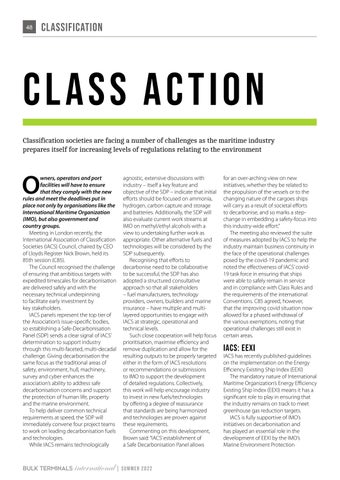48
Classification
CL ASS ACTION Classification societies are facing a number of challenges as the maritime industry prepares itself for increasing levels of regulations relating to the environment
O
wners, operators and port facilities will have to ensure that they comply with the new rules and meet the deadlines put in place not only by organisations like the International Maritime Organization (IMO), but also government and country groups. Meeting in London recently, the International Association of Classification Societies (IACS) Council, chaired by CEO of Lloyds Register Nick Brown, held its 85th session (C85). The Council recognised the challenge of ensuring that ambitious targets with expedited timescales for decarbonisation are delivered safely and with the necessary technical underpinning to facilitate early investment by key stakeholders. IACS panels represent the top tier of the Association’s issue-specific bodies, so establishing a Safe-Decarbonisation Panel (SDP) sends a clear signal of IACS’ determination to support industry through this multi-faceted, multi-decadal challenge. Giving decarbonisation the same focus as the traditional areas of safety, environment, hull, machinery, survey and cyber enhances the association’s ability to address safe decarbonisation concerns and support the protection of human life, property and the marine environment. To help deliver common technical requirements at speed, the SDP will immediately convene four project teams to work on leading decarbonisation fuels and technologies. While IACS remains technologically
BULK TERMINALS
agnostic, extensive discussions with industry – itself a key feature and objective of the SDP – indicate that initial efforts should be focused on ammonia, hydrogen, carbon capture and storage and batteries. Additionally, the SDP will also evaluate current work streams at IMO on methyl/ethyl alcohols with a view to undertaking further work as appropriate. Other alternative fuels and technologies will be considered by the SDP subsequently. Recognising that efforts to decarbonise need to be collaborative to be successful, the SDP has also adopted a structured consultative approach so that all stakeholders – fuel manufacturers, technology providers, owners, builders and marine insurance – have multiple and multilayered opportunities to engage with IACS at strategic, operational and technical levels. Such close cooperation will help focus prioritisation, maximise efficiency and remove duplication and allow for the resulting outputs to be properly targeted either in the form of IACS resolutions or recommendations or submissions to IMO to support the development of detailed regulations. Collectively, this work will help encourage industry to invest in new fuels/technologies by offering a degree of reassurance that standards are being harmonized and technologies are proven against these requirements. Commenting on this development, Brown said: “IACS’ establishment of a Safe Decarbonisation Panel allows
international | SUMMER 2022
for an over-arching view on new initiatives, whether they be related to the propulsion of the vessels or to the changing nature of the cargoes ships will carry as a result of societal efforts to decarbonise, and so marks a stepchange in embedding a safety-focus into this industry-wide effort.” The meeting also reviewed the suite of measures adopted by IACS to help the industry maintain business continuity in the face of the operational challenges posed by the covid-19 pandemic and noted the effectiveness of IACS’ covid19 task force in ensuring that ships were able to safely remain in service and in compliance with Class Rules and the requirements of the international Conventions. C85 agreed, however, that the improving covid situation now allowed for a phased withdrawal of the various exemptions, noting that operational challenges still exist in certain areas.
IACS: EEXI
IACS has recently published guidelines on the implementation on the Energy Efficiency Existing Ship Index (EEXI) The mandatory nature of International Maritime Organization’s Energy Efficiency Existing Ship Index (EEXI) means it has a significant role to play in ensuring that the industry remains on track to meet greenhouse gas reduction targets. IACS is fully supportive of IMO’s initiatives on decarbonisation and has played an essential role in the development of EEXI by the IMO’s Marine Environment Protection













